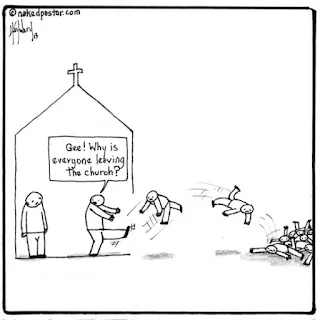After Dave Pack rebelled against Pasadena and WCG due tot eh doctrinal changes he decided to join forces with Rod Meredith. What he describes below proves once again how duplicitous the leadership of the United Church of God was. Not only did Kubik and others sit in church-owned housing, while still on WCG payroll as they planned UCG, they also manipulated the church in order to get as much money as they could before that left for UCG. Pack's comments below also show what a total jerk Rod Meredith was in starting up Global Church of God.
It was March 7, 1993. For the first time since 1972, Mr. Pack was unemployed—only this time the family was also without a vehicle! The Packs could not afford and never had a second car. He also had no computer to communicate through email.The Worldwide Church of God gave him only two weeks severance pay for his over two decades of service in the ministry, plus a few days of any unused vacation that all terminated ministers received by policy. The small severance was because the Packs had officially declared that they were going with another organization. This made them, also by policy, “opponents” of the WCG. Virtually all other ministers, most of whom that would leave would do so two years later, would receive one week of pay for every year that they were in the ministry—because they did not immediately declare their new allegiance. These waited until the larger check had cleared the bank. This was made possible by high-ranking sympathizers in Pasadena carefully coaching them step by step regarding exactly what (and what not) to do, and when.Mr. Pack took a deep breath and resolved to move forward—regardless of giant obstacles ahead.But what about a car? The Packs had insufficient money to buy one.Since the Global Church of God had been in existence for just two months, there were only about 275 members worldwide. There were a handful of deacons and local church elders to help, but no full-time ministers had yet been hired into the field. Mr. Pack was the first. The fledgling organization had limited resources. The tithe-paying base was small. The headquarters could not afford to advance a down payment for a car.Understanding the crucial juncture facing God’s people, Mr. Pack could not let days, let alone weeks, go by. There was work to do!His very first action as a yet unpaid minister was to go obtain a $4,000 cash advance on a personal credit card. He then sent these funds to the Global Church Headquarters so they could purchase a car in the Church’s name with this money. The promise was that they would try to repay the principal amount when and as they could.Thrilled to get back into the field and to visit brethren, Mr. Pack charged into this unique, new assignment with gusto.“Someone was kind enough to loan us a car until we could get a new one. We were most grateful. It allowed us to run errands and buy groceries for about 10 days.“We had faced obstacles in the past where the only path was that of faith. This decision was easy. But what choice did we have? We needed a car, and the Church could not afford to buy one. So I offered to act as an agent to purchase the vehicle on their behalf. There was a Ford dealer nearby and we got a brand new Aerostar exactly like the one that had just been driven from our garage.“It would look better for Global if it had purchased the vehicle, rather than I having done so on my own behalf, or even on their behalf. The goal was to have other ministers be able to see that Global was a legitimate organization—that all manner of familiar procedure, activity and support was present. We were happy that no other Global ministers had to do as we did. I would certainly do it again.“I would only learn later about how the many scores of ministers went with the new splinter in 1995 with a tremendous amount of money—sometimes tens of thousands of dollars—simply because they did not declare their affiliation until the larger ‘severance’ check had been cut for them.“These men would wait in the back of the hall for one Sabbath, officially ‘undeclared’ in terms of organizational destination. Of course, everyone knew exactly where they were going in a couple of days, and could not understand why they were delaying the changeover. There were always salaries, cars and expense accounts waiting from the start for these faithless, hypocritical appeasers because large numbers of tithepayers followed them out the door to the same new organization.“There was a very early surprise, however, in all of this. Instead of a thank-you for buying the car from my (borrowed) funds, the Global leader was disappointed that I had only brought an initial group of 38 people with me. It was absolutely stunning. I was not bringing enough human ‘booty’ right out of the gate to suit him.


